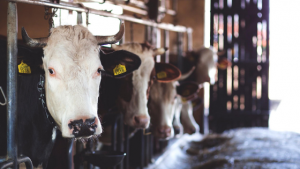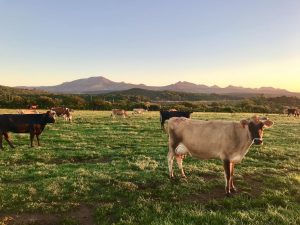Nearly all keto information out there tells you to choose grass-fed and free-range meat and dairy. But does the extra cost really make any difference to your diet?
Yes.
Just as the food we eat makes a big difference in our health, the same goes for animals.
What is “grass-fed”
As demand for beef and dairy products increase, more and more producers are opting for quantity over quality. The name of the game is to produce as much meat as possible with as little cost as possible.
That’s why factory farms cram several thousand cows together in a small space. They’re kept chained in one place with no exercise and fed GMO grains, corn, and soy-based feed the majority of their lives.
With no exercise and poor diet, these cows are given hormones to “beef” them up, and antibiotics to combat the diseases grown from the close quarters and unsanitary conditions.

It makes sense that when humans consume products from these cows, they also ingest the unhealthy diet, antibiotics, and hormones. Remember – you are what you eat!
Cattle that are free-range and grass-fed are raised in a pasture with grass to graze and room to roam. Being free-range allows the cattle to get exercise – greatly improving the quality of meat over cattle who are chained in one place in a factory farm most of their lives.
Health benefits of Grass-fed over factory farmed
Grass-fed beef is an incredibly nutrient-dense protein
Fewer calories.
You read that correctly, grass-fed beef has fewer calories than “conventional” beef. That’s because pasture-raised cows are lower in saturated fat and higher in good fats, like omega-3. One excellent reason to add it to your keto shopping list!
CLA (Conjugated Linoleic Acid)
Beef from grass-fed cows contains up to 3x the amount of a fatty acid called CLA. It has many health benefits including
- Reduces body fat
- Increases muscle mass
- Improves metabolic health
- One of the strongest anti-cancer nutrients
- Improve blood glucose levels
- Decreased risk of heart disease

Electrolytes
Grass-fed meat has ample amounts of the 3 essential electrolytes everyone on keto needs! A grass-fed strip steak has over 700mg of potassium, 50mg of magnesium, and around 100 mg of sodium.
Dairy
Meat isn’t the only grass-fed option you should consider. The same goes for bi-products of the cows, such as cheese and butter. Cows fed a healthier diet and provided exercise naturally produce higher quality milk with more nutrients. So that grass-fed butter really is worth the extra $.80.
When shopping for grass-fed beef and dairy, keep an eye out for products with the stamp of approval by the American Grassfed Association (AGA).
Free Range Chickens and Eggs
Life for a chicken raised on a commercial farm is in a cage, not much bigger than the bird itself. They experience high levels of stress, no exercise, and a GMO diet. Studies have shown that chickens, like cows, living a free-range life
- Are more nutrient-dense
- Have 10x more omega-3’s (those good fats)
- Taste better due to diet and exercise
- Aren’t injected with hormones or antibiotics
- Lower risk of unwanted pathogens – no thanks Salmonella!
Same as healthy cows make healthier milk, healthy chickens make healthier eggs! Eggs from free-range chickens pack an extra punch compared to commercial chicken eggs.
They’re:
- Also more nutrient-dense
- ⅓ less cholesterol
- ¼ less saturated fat
- ⅔ more vitamin A
- 2x more Omega-3
- 3x more vitamin E
- 7x more beta carotene

The average person on keto eats roughly 600 eggs a year. Imagine what 600x these extra nutrients could do for you!
So yes, grass-fed free-range products are an important consideration. Beef, butter, chicken, and eggs are all a huge part of your keto diet so it’s important to make sure these are coming from healthy sources.
Because if the food you eat isn’t healthy, how can it make you healthy?